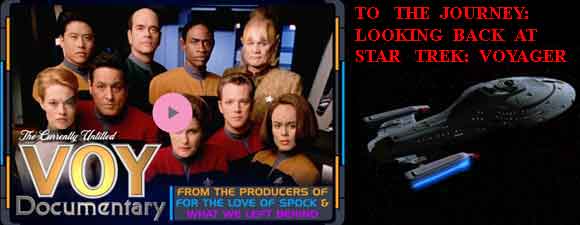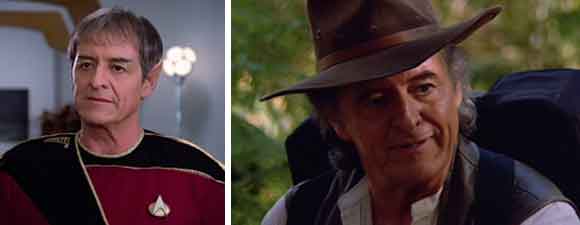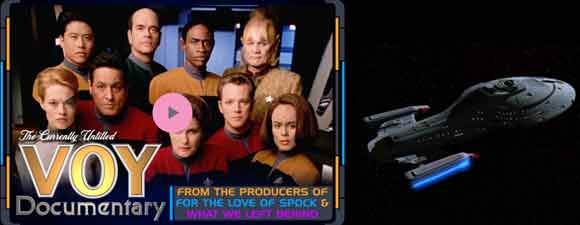Retro Review: Remember
7 min read
rememberbanner
Torres relives the memories of a woman involved in the extermination of a minority group, one of whom was her lover.
Plot Summary: While Voyager is transporting a group of trade-friendly Enarans from one of their colonies to their home planet, Torres begins to have intense, erotic dreams. She experiences life as Korenna, a young Enaran woman in love with a Regressive who does not want to expand Enaran colonization, whose father objects to their relationship as he encourages Karenna to join the military-industrial organization promoting Enaran space travel. When the dreams incapacitate Torres, the Doctor concludes that she is not dreaming at all, but experiencing memories implanted into her mind by the telepathic Enarans, who are able to pass on experiences like years of music lessons with a single touch. In the dream state, Torres discovers that Korenna’s father is part of a movement to round up and resettle the Regressives, claiming that their rejection of modern technology leaves them prone to disease. When Korenna’s face is scarred by an attack within the dream, Torres realizes that one of the Enarans on board, a similarly scarred woman named Mirell, must be giving her the memories. Mirell tells Torres that the other Enarans on board are trying to kill her, but she wants to make sure that the Regressives will never be forgotten, because – as Torres learns in a final vision while Mirell is dying – the Enaran leaders were not resettling but vaporizing the Regressives. Believing that her lover had betrayed her, Korenna had turned him over for execution, and later accepted her father’s explanation that the entire population of Regressives died because they rejected technology that might have saved them from illness and starvation. During a farewell dinner, Torres accuses the Enarans of slaughtering the Regressives and murdering Mirell to cover it up. Though the old woman dies on Voyager, Janeway tells Torres that it isn’t the crew’s place to investigate the possible genocide and judge the entire planet; she suggests that Torres talk to one of the friendly Enaran engineers. A young woman with a crush on Harry Kim agrees to share the memories, seeing herself in the initial vision in which Torres found herself living Korenna’s life.
Analysis: “Remember” may not be the best Holocaust allegory in science fiction television – arguably, it’s not even the best on Star Trek, given that it must compete with Deep Space Nine‘s “Duet” – but it’s the most effective Holocaust denial allegory I’ve ever seen. Rewatching it now, in a world facing a massive refugee crisis while candidates for public office talk about concentration camps for undesirable non-citizens, it’s more timely than ever, and it’s gripping even knowing how it’s going to end. The story is particularly powerful because the Enarans all appear to be friendly, open, family-oriented people who are appalled at the idea of intruding upon the crew’s memories without consent. Even the ostensible villain, Korenna’s father, acts out of love for his daughter, and while he oversees the executions of rebellious Regressives, it’s not clear whether he himself knows whether the Regressives are being massacred or whether he believes, as he tells his daughter, that they’re actually being resettled in one of the new colonies. He asks her, “Organized murder on such an enormous scale? Do you really believe that your family and friends are capable of that?” and at that moment, it seems plausible that he’s telling the truth as he understands it. Mirell is the oldest Enaran we see, so it’s likely that the perpetrators of this holocaust are long dead by the time Voyager arrives, having protected their prosperous descendants from the unspeakable truth that they scapegoated and murdered an entire population. This isn’t a political episode – there’s no direct real-world parallel to the Regressives, no explanation of how they wanted to live. It’s possible there’s no Enaran still alive who knows. Korenna Mirell can pass along her memories, but she can’t re-member the dead: she can’t know what her lover was thinking, she can’t separate the goals of the Regressives from the propaganda she’s learned all her life. This episode isn’t meant to spark a debate about how an advanced society should treat sects who choose not to use technology available to them. It’s about the way people who identify as progressive can justify the slaughter of thousands while claiming that they’re just protecting themselves from the risks posed by a minority with different values.
It’s an old story made new again and again – when the Church went on crusade against infidels – not just Saracens and Turks, but Livonians, Albigensians and other Christians – when European settlers drove out Native Americans, when Turks slaughtered Armenians, when Chinese displaced Tibetans, when Japan invaded China. You can find similar rhetoric to this day in contested areas of India and Pakistan by Muslims against Hindus and by Hindus against Muslims. The Holocaust wasn’t the first instance of genocide on an industrial scale; it wasn’t even the first time it was attempted against the Jews or Roma. The first time I reviewed “Remember,” ethnic Serbs were still eradicating Muslim citizens of their recently independent republic. Now, in newspapers across Europe and North America, as Syrian civilians flee what nearly everyone agrees is a horrific regime with a brutal, uncaring opposition, the propaganda against refugees has elements chillingly in common with the Enaran objections to Regressives. The Voyager material isn’t original, but taken from many such horror stories. Torres warns Janeway that if they don’t tell someone about what the older Enarans did, the younger ones could let it happen again, and though Janeway is evidently sympathetic, she’s also busy citing non-interference directives and pointing out that it’s not her problem – not like getting her crew home. I find it very curious how little anyone at the party reacts when Torres bursts in to accuse the Enarans of genocide – there are Bajorans and African-Americans among the crew, descendants of people treated little better than the Enarans treated the Regressives, and there are Maquis, people who chose to live as outlaws in order to try to right what they considered an atrocious wrong on the part of the progressive Federation. Chakotay is personally the victim of Cardassian oppression and descended from an indigenous population nearly wiped out by invaders, yet he’s more interested in B’Elanna’s sexy dreams than in the terrible implications of what she learns from them.
When we see the three pillars of execution set up like crucifixes for Korenna’s lover and two anonymous criminals, there’s no doubt that we’re supposed to be thinking of a much bigger betrayal than the awful end to their love story. Watching the implanted memories in “Remember,” one of the best episodes of Voyager, brings to mind a parallel storyline in “Retrospect,” which is surely the worst, in which Seven of Nine experiences a similar memory alteration that causes her to accuse a guest of violating her. The first time I saw “Remember,” I was angry because I thought Janeway wasn’t really listening to Torres, trying to share her sense of injustice; now, when I think about the cruelty with which Janeway will dismiss Seven’s experiences in “Retrospect,” I feel like Janeway actually does all she can by breaking off trade negotiations without putting her own crew at risk from the perfidious Enarans. Unsurprisingly, it’s a woman born on one of the Enaran colonies who’s open to exploring her people’s past, though at first she’s the most vocally resistant to the idea that her elders may have covered up such barbarism. The Enarans apparently believe that hiding the sins of their past will make for a happier future, since young people like the engineer believe that they have always been a unified, forward-thinking society, not that they have savage tendencies. I’m not sure whether the ending is meant to be hopeful or whether it’s indicative of the cycle of violent history that Torres sharing memories may not be enough to break. That young woman’s life will never be the same, even if she decides not to speak up or to share her experience only the way Mirell has done rather than risk vilification, exile, eradication. The well-constructed flashback has similarities with the Keeper of Memories from Lois Lowry’s famous dystopian novel The Giver, and is superbly directed by Winrich Kolbe, but it’s the performances of Roxann Dawson and of Bruce Davison as Korenna’s father that make the well-written story so emotional. This is Star Trek storytelling at its finest, offering sweeping social commentary in the context of a story that’s neither didactic nor overly blunt in its real-world parallels.






